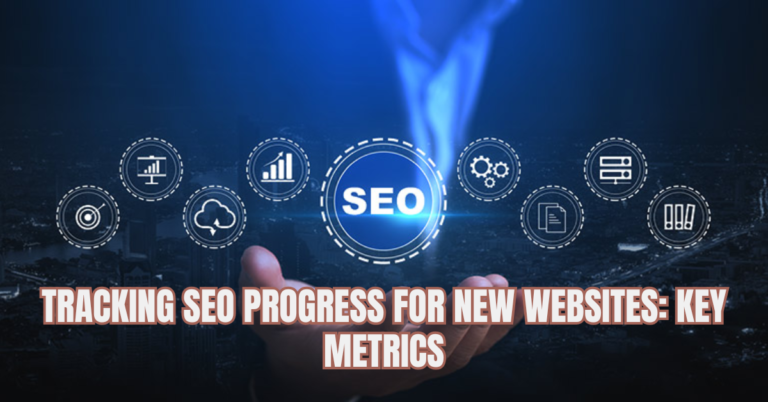Launching a new website is an exciting milestone, but to succeed online, you need to ensure it performs well in search engine rankings. Tracking your SEO progress with the right metrics provides insights into your website’s strengths, weaknesses, and opportunities for improvement. Monitoring these metrics from the outset helps you make informed decisions and stay on track to reach your SEO goals partnering with an SEO agency in Australia to achieve your goals. Here are some essential metrics for tracking SEO progress, particularly for new websites.
1. Organic Traffic
Organic traffic, or visitors who find your site through search engines, is a vital metric for any website. For new sites, increasing organic traffic indicates that your SEO efforts are starting to pay off. In the initial stages, organic traffic may be low, but as your site gains authority and begins ranking for more keywords, this metric should grow steadily.
To monitor organic traffic, use tools like Google Analytics. Focus on trends over time rather than short-term fluctuations. A steady increase in organic visitors means your site is becoming more visible, and your content is relevant to searchers.
2. Keyword Rankings
Keyword rankings show how well your site is performing for specific keywords or phrases. When you launch a new website, aim to rank for a mix of short-tail and long-tail keywords. While short-tail keywords have higher search volumes, long-tail keywords are often easier to rank for and can drive highly targeted traffic.
Tracking keyword rankings helps you assess whether your SEO strategy is moving in the right direction. If certain keywords are not ranking as desired, you may need to adjust your on-page SEO, improve content, or build more backlinks. Over time, improving your rankings for targeted keywords should lead to higher visibility and more organic traffic.
3. Bounce Rate
Bounce rate is the percentage of visitors who leave your site after viewing only one page. A high bounce rate might indicate that visitors aren’t finding what they’re looking for or that your content isn’t engaging. For a new site, keeping the bounce rate low is essential, as it shows that visitors find your content valuable and are exploring multiple pages.
To lower your bounce rate, focus on creating high-quality content, improving user experience, and ensuring that pages load quickly. For new websites, even small improvements in bounce rate can significantly impact SEO progress, as it suggests a better user experience.
4. Page Load Speed
Page load speed is critical for user experience and directly impacts SEO rankings. Slow-loading pages frustrate visitors and lead to higher bounce rates. Google has prioritized page speed as a ranking factor, making it essential for new websites to optimize loading times.
Using tools like Google PageSpeed Insights can help you assess your site’s loading speed and identify areas for improvement. Compress images, minimize code, and use efficient web hosting to speed up your site. A faster website not only improves user experience but also boosts your chances of ranking higher in search results.
5. Backlink Profile
A strong backlink profile is a core factor in SEO success. Backlinks from authoritative and relevant websites signal to Google that your site is credible and valuable. For new websites, building a healthy backlink profile can be challenging but essential to achieving visibility in search engines.
Track the number of backlinks and referring domains to measure your progress. Rather than focusing solely on quantity, prioritize high-quality backlinks from relevant sources. An SEO Expert in Melbourne can assist with developing a link-building strategy that attracts quality backlinks without violating Google’s guidelines.
6. Time on Site and Pages per Session
The amount of time visitors spend on your site, along with the number of pages they view in one session, indicates engagement levels. High engagement suggests that your content resonates with visitors, while low engagement may indicate a need for improvement.
To increase these metrics, focus on creating high-value, informative, and visually appealing content. Internal linking to related content also encourages users to spend more time on your site, exploring different pages. Increased engagement can contribute to better rankings, as Google interprets it as a signal of valuable content.
7. Conversions
Ultimately, the goal of any SEO effort is to drive conversions, whether it’s purchases, form submissions, sign-ups, or other actions. For new websites, tracking conversions is crucial to determine the effectiveness of your SEO strategy. Setting up goals in Google Analytics allows you to monitor conversion rates, so you can see which pages and keywords are driving conversions.
If conversion rates are lower than expected, assess whether your content aligns with user intent. Optimizing for conversions involves a combination of clear calls-to-action, user-friendly navigation, and relevant content that encourages users to take the next step.
8. SEO Website Audit
Performing an SEO website audit Sydney is essential for identifying and correcting issues that may hinder your site’s performance. An audit evaluates various technical and on-page elements, such as broken links, duplicate content, missing meta tags, and crawl errors, all of which impact SEO.
For new websites, an SEO audit provides a clear roadmap for optimization, ensuring that you address foundational issues early on. Regular audits help track your SEO progress, allowing you to see which improvements are making a positive difference and what areas still need work.
Tracking these key metrics can help you understand how well your SEO efforts are working for your new website. Metrics like organic traffic, keyword rankings, and page load speed provide insights into your site’s visibility and user experience. Analyzing engagement metrics such as bounce rate and time on site can help you improve content and usability, while monitoring your backlink profile and conducting regular SEO website audits ensures that your site maintains a strong foundation for growth.
Partnering with an SEO Specialist in Sydney can further enhance your ability to track and improve these metrics, helping your new website achieve its full potential in search rankings.

